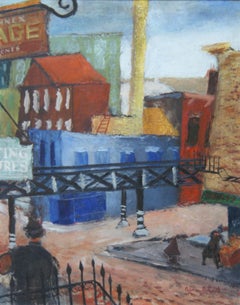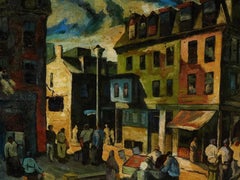Want more images or videos?
Request additional images or videos from the seller
1 of 9
Stowell ShermanWPA Scene American Modernism 20th Century Workers Strike Realism Industrialc. 1930s
c. 1930s
Price:$2,850
$3,900List Price
About the Item
- Creator:Stowell Sherman (1886 - 1973, American)
- Creation Year:c. 1930s
- Dimensions:Height: 22 in (55.88 cm)Width: 26 in (66.04 cm)Depth: 2 in (5.08 cm)
- Medium:
- Movement & Style:
- Period:
- Condition:
- Gallery Location:New York, NY
- Reference Number:1stDibs: LU115629027742
About the Seller
5.0
Gold Seller
Premium sellers maintaining a 4.3+ rating and 24-hour response times
Established in 2008
1stDibs seller since 2019
195 sales on 1stDibs
Authenticity Guarantee
In the unlikely event there’s an issue with an item’s authenticity, contact us within 1 year for a full refund. DetailsMoney-Back Guarantee
If your item is not as described, is damaged in transit, or does not arrive, contact us within 7 days for a full refund. Details24-Hour Cancellation
You have a 24-hour grace period in which to reconsider your purchase, with no questions asked.Vetted Professional Sellers
Our world-class sellers must adhere to strict standards for service and quality, maintaining the integrity of our listings.Price-Match Guarantee
If you find that a seller listed the same item for a lower price elsewhere, we’ll match it.Trusted Global Delivery
Our best-in-class carrier network provides specialized shipping options worldwide, including custom delivery.You May Also Like
20th century figurative landscape oil painting pastoral scene farm field cow
By Sylvia Spicuzza
Located in Milwaukee, WI
This early work by American artist Sylvia Spicuzza is an excellent example of Regionalism: in the foreground, a farmer in blue stands before a herd of cattle. Beyond the fence of the...
Category
1930s American Modern Figurative Paintings
Materials
Oil, Board
$12,800
H 31.63 in W 23.13 in
Night Life in the City - Figurative Cityscape
Located in Soquel, CA
Night Life in the City - Figurative Cityscape
Mid 1960s cityscape by an unknown artist. Oil on artists board.
Image, 16"H x 20"W
Category
1960s American Modern Figurative Paintings
Materials
Canvas, Oil, Illustration Board
$600 Sale Price
20% Off
H 16 in W 20 in D 0.13 in
"Mutual Admiration" Flower Mid-Century Modern Oil Painting Monterey Artist
Located in Soquel, CA
"Mutual Admiration" Flower Mid-Century Modern Oil Painting Monterey Artist
Mid-Century Modern painting of a little blonde girl in a white apron adoring her flowers by Monterey Artist Rose Marie (Smith) Ansel, (American, 1921-2012)
Rose Marie was born and lived in the Monterey area all her life. She volunteered in various city government associations and founded the Parade of Nations in 1970 which celebrated the many ethnic cultures on the Monterey Peninsula...
Category
1960s American Modern Figurative Paintings
Materials
Canvas, Oil, Illustration Board
$780 Sale Price
20% Off
H 26 in W 32 in D 2 in
Frederick Shane “Twilight of History” 1947 Surrealist Oil Painting, Signed
By Frederick Shane
Located in Denver, CO
"Twilight of History" is a powerful and evocative original oil painting on board by renowned American artist Frederick Shane (1906–1992), created in 1947. This deeply symbolic work e...
Category
1940s American Modern Figurative Paintings
Materials
Oil, Board
$3,750
H 24.5 in W 28.5 in D 2.75 in
Cabin in a Snowy Forest by American artist Elizabeth Dailey
Located in New York, NY
Elizabeth Dailey
Untitled, c. 20th Century
Oil on board
Sight: 19 1/2 x 23 1/2 in.
Framed: 21 x 25 x 1 in.
Signed lower right: Elizabeth Dailey
This lovely painting by an American a...
Category
20th Century American Modern Landscape Paintings
Materials
Oil, Board
$1,000
H 21 in W 25 in D 1 in
Large Modernist Oil Painting 1940s, Judaica Hasidic Shtetl Wagon Driver WPA Era
By Emanuel Glicenstein Romano
Located in Surfside, FL
Genre: Modern
Subject: Landscape with figure of horse, driver and wagon
Medium: Oil
Surface: wood Board
Hand signed lower middle E.Romano
EMANUEL ROMANO
Rome, Italy, b. 1897, d. 1984
Emanuel Glicen Romano was born in Rome, September 23, 1897.
His father Henryk Glicenstein was a sculptor and was living in Rome with his wife Helena (born Hirszenberg) when Emanuel was born. His father obtained Italian citizenship and adopted the name Enrico. Emanuel was brought up in Italy, Switzerland, Germany, England and Poland.
In 1926 Emanuel Glicenstein Romano and his father sailed for New York. They briefly visited Chicago. Romano's sister, Beatrice, and mother only joined them in New York years later.
Romano changed his name on his arrival to America and some have erroneously speculated that this was to avoid antisemitic discrimination. In truth, as the son of a highly-regarded artist, Romano changed his name to ensure that any success or recognition he would later attain, would be the result of nothing other than his own merit as an artist, and not on account of his father's fame.
In 1936 Romano was worked for the WPA Federal Art Project creating murals. ( there were many jewish artists active with in the WPA period. notably Chaim Gross, Ben Shahn, Isaac and Moses Soyer, Abraham Rattner and many others. During and immediately after World War II, Romano created a series of allegorical works depicting graphic holocaust images that were held closely by the family until after his passing. One of these works is now on permanent display in the Florida Holocaust Museum in St. Petersburg Florida.
Emanuel's father died in 1942 in a car accident before they could realize their shared dream of visiting Israel.
In 1944 Romano, having completed his degree at the Pennsylvania Academy of Fine Arts and the Art Institute of Chicago, began teaching at the City College of New York.
Romano moved to Safed, Israel in 1953 and established an art museum in his father's memory, the Glicenstein Museum.
COLLECTIONS
Indianapolis Museum of Art
Metropolitan Museum of Art
Boston Fine Arts Museum
Fogg Museum
Musée Nacional de France
Recently his work has been added to the Florida Holocaust Museum collection. His notable works include his holocaust themed allegorical paintings as well as portraits of Marianne Moore, his father and William Carlos Williams...
Category
1930s American Modern Figurative Paintings
Materials
Oil, Board
A Pair of Modern Impressionist Landscape Oil Paintings Framed Female artist NY
Located in Buffalo, NY
A Pair of Modernist Landscapes by listed female artist Margaret Munro Stratton McLennan.
Margaret was a painter working in the early 20th Century in the Syracuse area. These charmi...
Category
1920s American Modern Landscape Paintings
Materials
Oil, Board
$600 Sale Price
20% Off
H 5 in W 7 in
Original Antique American Landscape Fishing Delaware River Oil Painting Framed
Located in Buffalo, NY
A lovely scene adeptly painted by listed American artist and illustrator Jan Nosek (1876 - 1966) who was active in the late 19th and early 20th Century. This scene created in the ea...
Category
1910s American Modern Landscape Paintings
Materials
Oil, Board
Coney Island, Fourth of July
Located in Los Angeles, CA
Coney Island, Fourth of July, c. 1940s, oil on canvas applied to Masonite, signed upper right, 26 x 21 1/2 inches, presented in its original frame
During the 1930s and 40s, Coney I...
Category
1940s American Modern Figurative Paintings
Materials
Board, Oil, Canvas
American West Mountainscape by Gunnar Anderson
Located in New York, NY
Gunnar Donald Anderson (American, 1927-2022)
Untitled, c. 20th Century
Oil on board
Sight: 11 1/2 x 15 3/4 in.
Framed: 20 1/2 x 24 1/2 x 1 1/4 i...
Category
20th Century American Modern Landscape Paintings
Materials
Oil, Board
$2,300
H 20.5 in W 24.5 in D 1.25 in
More From This Seller
View All"6th Avenue El" American Scene Social Realism Mid-20th Century New York City
By Ernest Fiene
Located in New York, NY
"6th Avenue El" American Scene Social Realism Mid-20th Century New York City
Ernest Fiene (1894-1965)
"6th Avenue El"
12 1/4 x 14 1/4
Oil on canvas board, c. 1940s
Signed lower righ...
Category
1940s American Modern Figurative Paintings
Materials
Oil, Board
"Industrial Cityscape, Chicago" WPA Modernism Mid-Century Cityscape 20th Century
By Aaron Bohrod
Located in New York, NY
"Industrial Cityscape, Chicago" WPA Modernism Mid-Century Cityscape 20th Century
Aaron Bohrod (American 1907 – 1992)
Industrial Cityscape
20 x 16 inches
Oil on board
Signed lower ri...
Category
1930s American Modern Landscape Paintings
Materials
Oil, Board
"Money Lender" WPA American Scene Social Realism Modern Mid 20th Century
By Mervin Jules
Located in New York, NY
"Money Lender" WPA American Scene Social Realism Modernism Mid Century
Mervin M Jules (1912-1994
"The Money Lender"
15 1/2 x 20 1/2 inches
Oil on board, c. 1940s
Signed lower left
F...
Category
1940s American Modern Figurative Paintings
Materials
Oil, Board
Cityscape Mid-20th Century Modern Social Realism American Scene Regionalism WPA
Located in New York, NY
Cityscape Mid-20th Century Modern Social Realism American Scene Regionalism WPA
Samuel Thal (1903 to 1964)
"Cityscene"
12 x 16 inches
Oil on board, c. 1940s
Signed verso
Framed: 19...
Category
1940s American Modern Figurative Paintings
Materials
Board, Oil
"Union Square" NYC American Scene Social Realism Modernism WPA Mid-20th Century
By Agnes Hart
Located in New York, NY
"Union Square" NYC American Scene Social Realism Modernism WPA Mid-20th Century
Agnes Hart (American, 1912-1979)
"Union Square, New York City"
Sight: 14 1/2 x 21 1/2 inches
Gouache...
Category
1940s American Modern Landscape Paintings
Materials
Gouache, Board
"Concert" Early 20th Century WPA Modernism American City Landscape Scene Ashcan
By Michael Loew
Located in New York, NY
"Concert" Early 20th Century WPA Modernism American City Landscape Scene Ashcan
The size of the canvas 28 3/4 x 43 1/4 inches. The painting comes directly from the artist's estate. It is signed lower right as well as signed, titled and dated verso.
We have available more than two dozen paintings and works on paper from the 1930s - 80s that come directly from the Loew estate.
BIO
Michael Loew (1907 – 1985) was the son of a New York City baker. After high school, he was an apprentice to a stained-glass maker, and from 1926-1929, he studied at the Art Students League. In 1929, he traveled to Paris, North Africa, Germany, and Italy with a group of artists. When he returned to New York City in 1931, the Great Depression hit Loew unexpectedly, and for the next two years he paid his apartment rent with his paintings. In 1935, he found work with the WPA where he painted murals and partnered up with longtime friend Willem de Kooning in 1939 on a mural for the Hall of Pharmacy at the New York World’s Fair. Their friendship lasted for the rest of their lives. In the mid-30’s he painted in Mexico and the Yucatán documenting the construction of a U.S. Naval airbase on Tinian Island. It was from this airbase that the Enola...
Category
1920s American Modern Figurative Paintings
Materials
Canvas, Oil

